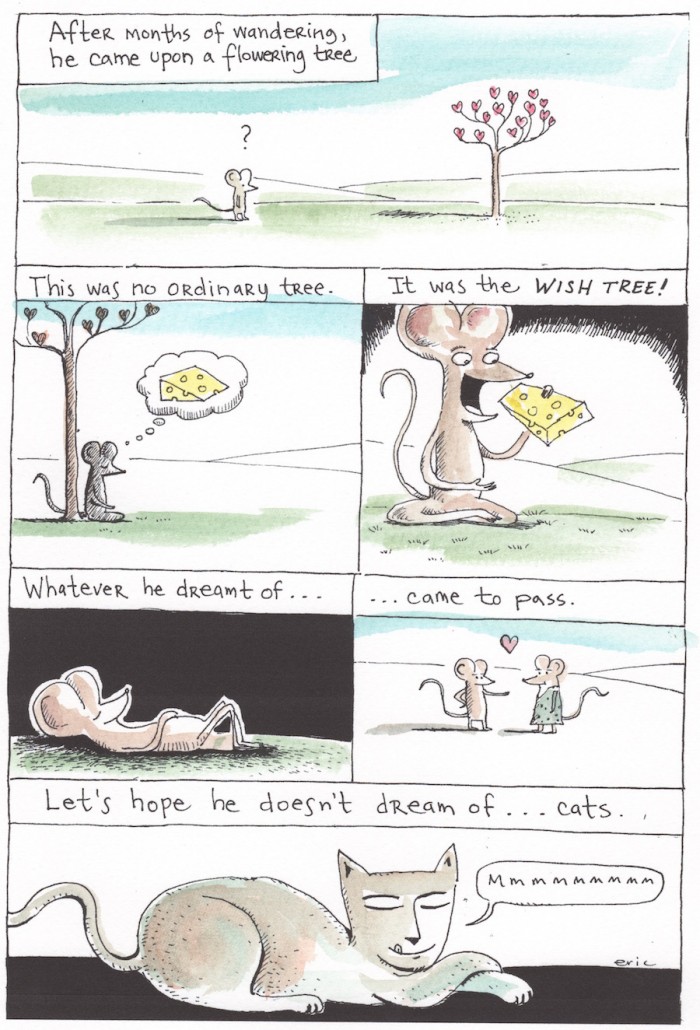
Your innate creative/spiritual essence is beyond words. It is best described in images and metaphors: a magic lamp, a burning bush, a healing fountain, a holy grail.
An image I love is that of the wish tree. What is the wish tree?
The wish tree is an image of your creative potential.
In the language of science, the wish tree symbolizes your neurological potential.
According to sages, mystics, and teachers of all wisdom traditions, the human nervous system is designed for awakening.
Remember the Buddha seated beside the Bodhi Tree?
Having exhausted his outward search for fulfillment, the Buddha sat down and placed his back against a mighty Bodhi tree. In doing so, he was re-enacting an primordial human activity: taking shelter under the outstretched limbs of the tree; feeling the support of the powerful trunk.
Images of sacred trees exist in all cultures and sacred traditions.
Trees—in their annual cycle wherein foliage appears, decays, and reappears—symbolize the birth, death, and rebirth cycle.
Rooted in the earth, while reaching into the sky, the tree symbolizes our neurological capacity to realize, embody, and express spacious, radiant awareness in the grounded activities of daily life.
Many wisdom traditions refer to the Tree of Life, the axis mundi, the central pillar or world axis from which all beings arise.
These symbols are reminders.
Like all sacred symbols, they are about you. They are pointing to the reality of your life; to the sacred potential of your neurology. Because, your neurology is structured for realizing, embodying, and expressing enlightened presence in, as, and through your life.
The spine is your axis mundi.
The spine is the central pillar of your experience. It is the trunk from which all the branches of your neurology unfold.
When you sit in meditation, you return attention to the spine; you take your seat under the sacred tree of your own neurology.
Your neurology is the wish tree.
It has the capacity to resonate with the most sublime, creative, sacred states of wisdom or the darkest, most destructive moods.
Your neurological wish tree can bring forth the fruits of peace, love, and abundance. But not if it’s left untended.
Your wish tree needs tending.
Here’s how it works: the experiences that you are having today are the fruits of past cultivation. Your past experiences—but much, much, more so your reactions to those experience—have shaped your neurology.
These reactions were (and continue to be) unconscious impulses of self-protection and defensiveness. They may have been appropriate at one time but now they need tending.
The shape of your neurology determines the quality of your experience now.
Thus, the reactive experience of the past will continue—unless you care for the tree and tend a new dream. And you can. This is one of the beautiful things about your neurological tree. It can renew itself.
With a little intentional practice of meditation, you can heal, balance, and transform the past. You can re-shape your neurology.
In the words of Rick Hanson, Ph.D. “You can use your mind to change your brain to change your mind.”
You can cultivate wisdom, peace, bliss.
You can dream a new dream. Or you can continue to dream the dreams of the past. It’s truly a matter of choice, cultivation, and practice.
You’re always practicing: either the patterns of the past or those of a new, wiser dream.
Through meditation practice, you return the sacred tree of your neurology to its original shape and function. Take your seat.
Care for the tree and it will feed you with fruits of wisdom and love.
What are the fruits of the past that you want to continue cultivating?
What new states of mind/heart do you want to cultivate?
Share your wisdom below.
Love & Shanti
Eric
More awesome from Eric:
How to Let Go & Move On.
To Control or Not to Control The Restless Mind.
Author: Eric Klein
Editor: Renée Picard
Images: original illustrations by the author






Read 0 comments and reply